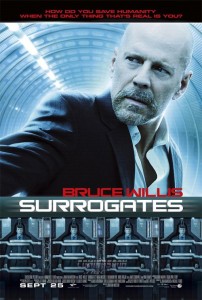 One of the more interesting research and writing projects I worked on earlier this year was a chapter for a forthcoming book through Westminster John Knox Press on videogames and digital cultures where I presented some thoughts on a techno theology of cybersociality, the interactions between human beings over the Internet and through other digital technologies and what this might say about an expression of human nature in relation to the sacred as well. While we usually take them for granted, I find the increasing presence of these technologies in our lives of great interest, and they provide a number of considerations worth reflecting on. Given this research interest I was pleased to hear of Surrogates, a science fiction film that dovetails with these areas, due for release on September 25.
One of the more interesting research and writing projects I worked on earlier this year was a chapter for a forthcoming book through Westminster John Knox Press on videogames and digital cultures where I presented some thoughts on a techno theology of cybersociality, the interactions between human beings over the Internet and through other digital technologies and what this might say about an expression of human nature in relation to the sacred as well. While we usually take them for granted, I find the increasing presence of these technologies in our lives of great interest, and they provide a number of considerations worth reflecting on. Given this research interest I was pleased to hear of Surrogates, a science fiction film that dovetails with these areas, due for release on September 25.
The film, based on the graphic novel by Robert Venditti and Brett Weldele, presents a world not too far removed from ours in terms of digital and robotic technology wherein individuals are “plugged in” and interact with each other not through social networking Internet sites or avatars in digital worlds like Second Life, but through humanoid robots created by Virtual Self Industries. Much like we choose avatars today to represent our ideal digital selves, in Surrogates individuals can choose “perfect” robotic representations and feel whatever scenarios and fantasies their robotic surrogates experience. This leads to people spending most of their lives lived through their surrogates in a utopian world of pleasure without suffering and crime. Along the way someone hacks into the system and uses the surrogates to commit murder, the first seen in fifteen years. FBI agent Greer, played by Bruce Willis, launches an investigation into the crimes, only to uncover a conspiracy, and through the process comes to question what it means to be human and the human-robotic relationship.
 Although the sci-fi premise and scenario of Surrogates might seem far removed from our own circumstances it may not really be the case. Consider our fascination with “pseudo-events,” the play revolution fueled by digital entertainment, and posthumanism. In his book The Image: A Guide to Pseudo-Events in America (Vintage, 1992), historian Daniel Boorstin argues that Americans live in an “age of contrivance” and that our public lives are filled with various “pseudo-events” or “artificial products” that simulate reality and which leave the individual who experiences the events or utilizes various products feeling as if they have experienced reality when in fact they have had their stereotypes confirmed by an encounter with the simulation. In addition to our experiences with pseudo-events, recall the great amounts of time we spend on play, particularly in the digital realm. Play is becoming an increasingly significant facet of life in those parts of the world where economic factors allow it to be so. This is particularly the case with the continued popularity of professional sports, and a new dimension of play has arisen with the increasing numbers of people spending time in various virtual worlds in cyberspace, such as Lineage, Gaia Online or Second Life. In his book Exodus to the Virtual World: How Online Fun is Changing Reality (Palgrave MacMillan, 2007), Edward Castronova believes a “fun revolution” is underway that will change the way in which we behave in the “real world.” He says that, “An understanding of fun will become integral to understanding why the real world is losing people [to virtual worlds], and what to do about it.” Finally, there are the discussions of transhumanism or posthumanism where the combination of robotics and human consciousness are seen as the next steps in human evolution and societal development. When the concepts of pseudo-identity, the large numbers of people spending great amounts of time in cyberspace or in other forms of digital entertainment, and posthumanism are taken together, it is not too much of a stretch to conceive of a future wherein people play or live their lives immersed in fantasy scenarios through robotic avatars as in Surrogates.
Although the sci-fi premise and scenario of Surrogates might seem far removed from our own circumstances it may not really be the case. Consider our fascination with “pseudo-events,” the play revolution fueled by digital entertainment, and posthumanism. In his book The Image: A Guide to Pseudo-Events in America (Vintage, 1992), historian Daniel Boorstin argues that Americans live in an “age of contrivance” and that our public lives are filled with various “pseudo-events” or “artificial products” that simulate reality and which leave the individual who experiences the events or utilizes various products feeling as if they have experienced reality when in fact they have had their stereotypes confirmed by an encounter with the simulation. In addition to our experiences with pseudo-events, recall the great amounts of time we spend on play, particularly in the digital realm. Play is becoming an increasingly significant facet of life in those parts of the world where economic factors allow it to be so. This is particularly the case with the continued popularity of professional sports, and a new dimension of play has arisen with the increasing numbers of people spending time in various virtual worlds in cyberspace, such as Lineage, Gaia Online or Second Life. In his book Exodus to the Virtual World: How Online Fun is Changing Reality (Palgrave MacMillan, 2007), Edward Castronova believes a “fun revolution” is underway that will change the way in which we behave in the “real world.” He says that, “An understanding of fun will become integral to understanding why the real world is losing people [to virtual worlds], and what to do about it.” Finally, there are the discussions of transhumanism or posthumanism where the combination of robotics and human consciousness are seen as the next steps in human evolution and societal development. When the concepts of pseudo-identity, the large numbers of people spending great amounts of time in cyberspace or in other forms of digital entertainment, and posthumanism are taken together, it is not too much of a stretch to conceive of a future wherein people play or live their lives immersed in fantasy scenarios through robotic avatars as in Surrogates.
Given the subject matter, and advances in various digital and robotic technologies, perhaps this film will function as a combination of Westworld and the Blade Runner for the 21st century. In addition to the sci fi-thriller aspects of this film I am looking forward to the issues the film will raise as it touches on our deepening relationship with digital technologies, simulated and synthetic experiences, and concepts of virtual and “real world” identities as well as idealized selves. (On issues related to avatars and identity see Mark Stephen Meadows’s I, Avatar: The Culture and Consequences of Having a Second Life [New Riders Press, 2008].) I have added this movie to my growing list of fantastic cinema for the fall.





My reading of popular fiction that explores humanity and cybernetics and robotics and stuff appears to explore one or both of two questions. What is lacking in our humanness that we seek in technology? Conversely, what is so great about being human that robots crave? The gentle nuances of simple themes like love, hate and loss are popular in movies like Terminator 2 and AI, where audiences are invited to question which of us can handle better these emotions, and therefore warrant survival. Narratives like Vurt and Neuromancer offer (in my opinion) a deeper immersion into the core of human wonder to connect blood and metal: that we are ultimately unsatisfied with our own sense of the material world, and seek another window through which to explore the purpose of our existence. To use Wertheim’s analogy, when religion fails to construct for us the “new heaven and new earth” that we want, we risk the potential of drugs, guitar music, computers and robots to create those places.
From the very little that I’ve seen of and about Surrogates, it appears that (or at least I read into it that) the movie attempts to grapple these questions around the themes of fear and beauty. Timely, I suppose, given both in the past decade have been important political and economic currencies. The ability to take risks without fear of harm, and the promise of easily eliminating the ugly stick we were born with at will. It seems ironic that Surrogates are promoted as having the beauty of the human body, since it is the technology that makes the body beautiful, whereas actual human bodies are flawed by their biology. With the removal of such important flaws, there is no reason to leave the second life we’ve made, and all inhabitants of the real world have been replaced.
I guess if asked the God question about this, I would wonder if this movie is like many others in promoting the notion that it is better to be a flawed creature than an imperfect creator. In the Truman Show we see what happens when humans create a perfected virtual world and place an unwitting human inside it. In both I, Robot and the Terminator trilogy, humans let man-made computer logic determine humanity’s destiny to find that it will turn against them. In Surrogates, humans lose themselves in the virtual world they’ve made, refusing to leave it. Moreover, the real world is replaced with the virtual – actual streets and lanes are used by virtual beings. In the realm of popular western narrative, it is only logical that this world order must fail, as virtual reality can only exist alongside natural/God-made/etc reality, and that neither robots nor humans can survive in an otherwise constructed universe.